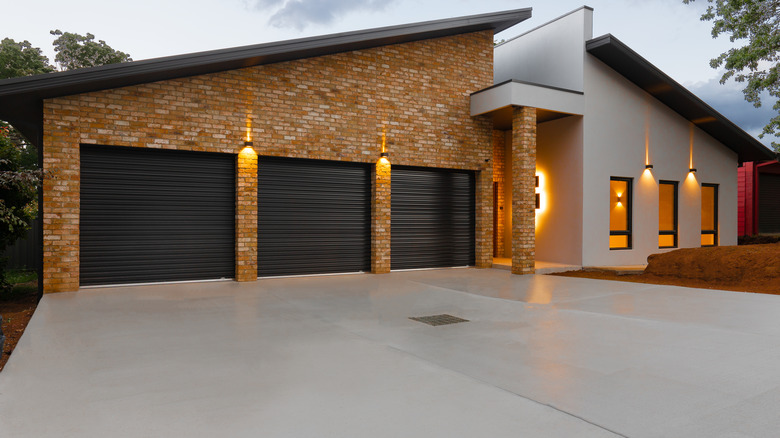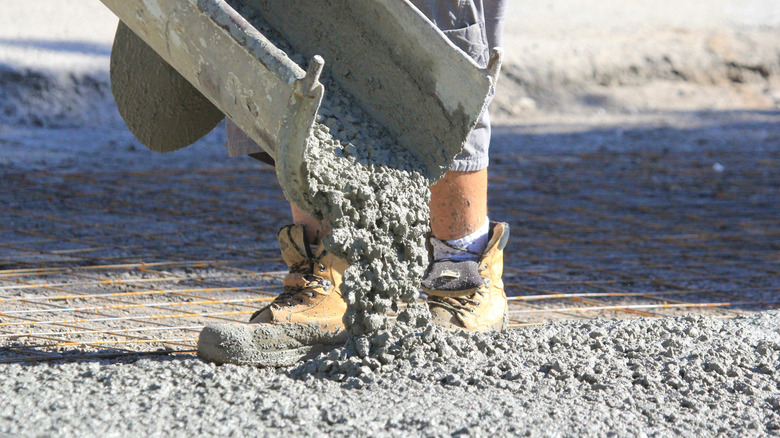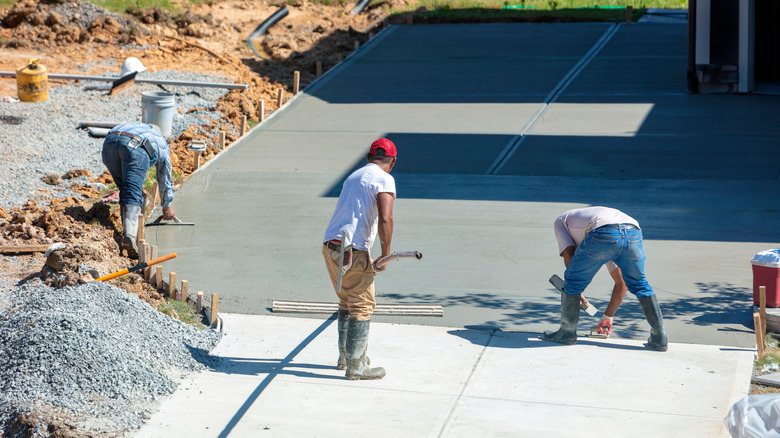The Best Concrete For Your Driveway, According To An Expert
From decorative brick, asphalt, and even turf, the material you use for your new driveway will impact your home's curb appeal and determine the durability and cost of the end product. Unfortunately, plenty of popular materials have their limitations. Brick driveways have the disadvantage of a higher cost due to the material itself and the labor it takes to complete the job, not to mention the problem of the individual brickwork shifting over time, per Pacific Coast Paving. Although relatively cheap to install, asphalt has a drab monotone color and a shorter lifespan than other materials.
For these reasons, poured concrete might be the most attractive material for many homeowners. However, even if you have decided to install this type of driveway, the choices don't end there. In an exclusive interview with House Digest, we asked the Founder of CC Concrete of Indianapolis, Art Coller, what he thinks is the best variety for your driveway. "From the type of concrete to the climate in your area and your budget, it is important to weigh your options and make an informed decision," Coller says. "Whether you choose plain, stamped, or stained concrete, your driveway is sure to be a functional and attractive addition to your home."
Understanding the different types of concrete
Although you're likely familiar with this common material— it's used for sidewalks and in most buildings — you may be unaware of the options available for your new driveway. "Plain concrete is a classic," says Coller. "It's made by combining cement, sand, water, and aggregate (like gravel or rocks) to create a solid and sturdy surface. This type of concrete is the most cost-effective option." This option can also be durable enough to have a longer lifespan than other driveway materials and is easily maintained and repaired if cracks settle in after years of use.
Looking to boost your home's curb appeal with your driveway? You're in luck. "Stamped concrete is a creative option that offers a unique look reminiscent of natural stone, brick, or other materials," Coller says. "It is created by using a stamping process which imprints a pattern onto the wet concrete. Although it is more expensive than basic concrete, it adds an aesthetically appealing touch to your home and can increase its value."
You may also opt to personalize your driveway with a unique color. With modern techniques, your choices are nearly limitless. "Stained concrete is decorative concrete that adds vibrancy. It's created by introducing colored chemicals, dyes, or pigments onto the concrete surface," Coller notes. "This option is incredibly versatile and can be used to reflect your own individual style."
Consider your climate, driveway size, and budget
Where you live should also inform your choice of material. Choosing wisely will maximize the lifespan of your driveway. "In hotter climates, it's important to select a concrete that can withstand high temperatures and UV exposure," says Coller. "If you live in a colder climate, you should choose a concrete that can handle freeze-thaw cycles." Keep in mind, this material can behave erratically in extreme temperatures, so schedule the job during a temperate time of year for optimal results.
Naturally, the size and scope of your driveway will also play a part in determining the variety that's ideal for your application. Whether it'll be a small, practical number, or an ornate part of your yard, there's a material to suit the job. "If beauty is your goal and you have a larger driveway, stamped or stained concrete is usually the more aesthetically appealing choice as it provides more surface area for decorative purposes," Coller says. "If your driveway is on the smaller side, plain concrete may be a more cost-effective solution."
Whatever you choose, plan your budget ahead of time to ensure a sound financial decision. "While stamped or stained concrete might be more visually appealing, they usually come with a higher price tag than plain concrete," Coller says. "Make sure to consider your budget when making your decision so that you can get the most bang for your buck."


